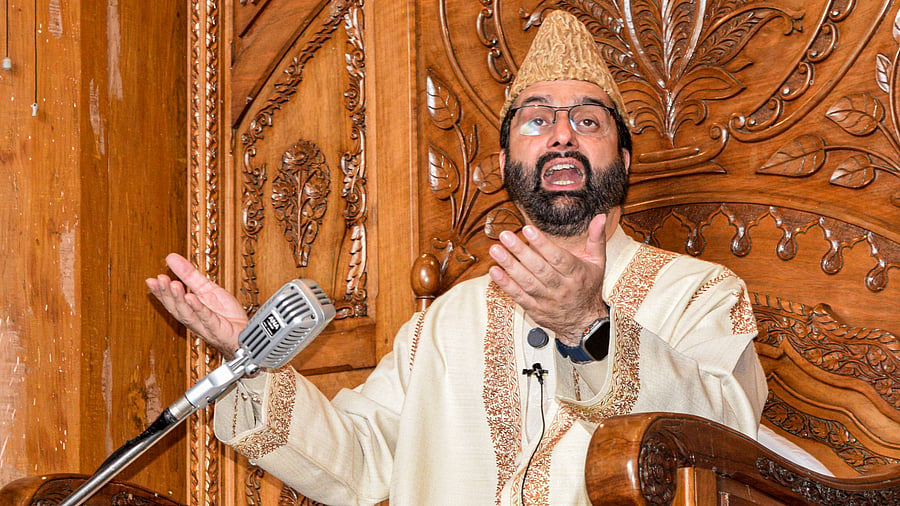
Hurriyat Conference Chairman and Chief Cleric of Jammu and Kashmir Mirwaiz Umar Farooq addresses the Friday congregation at Jamia Masjid, in Srinagar, Friday, May 16, 2025.
Credit: PTI Photo
Srinagar: A fresh wave of appeals by Kashmiri mainstream leaders for medical aid to jailed separatists and for engagement with Hurriyat chief Mirwaiz Umar Farooq have revived focus on the enduring link between electoral politics and the legacy of separatist influence in the Valley.
What began with ruling National Conference (NC) MP Aga Ruhullah Mehdi writing to Union Home Minister Amit Shah about the deteriorating health of jailed separatist leader Shabir Shah, was quickly echoed by People’s Democratic Party (PDP) chief and former chief minister Mehbooba Mufti, CPM’s M Y Tarigami, People’s Conference chief Sajjad Lone and Apni Party president Altaf Bukhari, who added that Mirwaiz Umar Farooq’s outreach to New Delhi must be met with confidence-building measures.
Simultaneously, Mehbooba also demanded urgent medical attention for Hameed Fayaz, head of the banned Jamaat-e-Islami, incarcerated since 2019 and reportedly in need of surgery.
These coordinated appeals — crossing ideological lines and party boundaries — have once again highlighted the complex political undercurrents in post-Article 370 Kashmir, where mainstream parties, despite operating under a drastically altered constitutional framework, appear to be re-engaging with constituencies once shaped by separatist and religious organisations.
Although the NC won a clear majority in the September-October 2024 Assembly elections, returning to power after six years of Central rule, the political discourse in the Valley suggests that the mainstream-separatist dynamic — while no longer institutionally visible — still resonates in public sentiment and strategic calculations.
“The appeals for medical care and dialogue are officially framed as humanitarian or reconciliatory, but they unmistakably touch on the anxieties of a significant section of the Kashmiri electorate — particularly those who once supported or were influenced by groups like Jamaat-e-Islami and the Mirwaiz-led Hurriyat,” a political analyst in Srinagar told DH.
He said the present moment mirrors earlier phases in Kashmir’s political history, when parties like the NC and PDP jockeyed for influence among soft-separatist or religiously aligned voters, especially in south Kashmir, where the Jamaat had deep roots.
A former MLA while commenting on the new developments said, “This isn’t a direct alignment, but it’s certainly a gesture to reconnect with past constituencies, many of whom feel disenfranchised in the post-2019 scenario.”
“These voters may not have a party today, but they still have preferences, grievances — and memories,” he added.
Jamaat-e-Islami, banned under UAPA in 2019 following the Pulwama suicide attack in which 40 paramilitary CRPF personnel were killed, was more than a political outfit. It operated an extensive network of schools, religious centres, and welfare institutions, and its influence still lingers in many towns and villages — even if underground.
Similarly, Mirwaiz, although sidelined for years after the August 5, 2019 changes, retains a considerable following through his sermons and stature as a religious leader.
Altaf Bukhari’s statement — calling on the government to reciprocate Mirwaiz’s recent appeal for engagement — marks a notable shift. While his Apni Party, perceived in Kashmir as proxy of BJP, had earlier positioned itself as pragmatic and development-focused, the outreach suggests a recalibrated political strategy aimed at broader societal legitimacy.
For Mehbooba Mufti, whose PDP faced a sharp decline in the 2024 polls, the renewed focus on human rights, political reconciliation, and prisoner rights appears to be part of an effort to revive her party’s traditional base, which once straddled religious conservatism and moderate separatist sentiment.
Even Aga Ruhullah Mehdi, who has emerged as a vocal conscience within the NC, seems intent on defining a moral high ground within mainstream politics by speaking on sensitive issues often avoided by others.
New Delhi has maintained silence so far. “Given its hardline stance on separatism post-2019 and consistent emphasis on national security, any gestures of accommodation — even medical access — will likely be filtered through legal, not political, channels,” a senior official said.